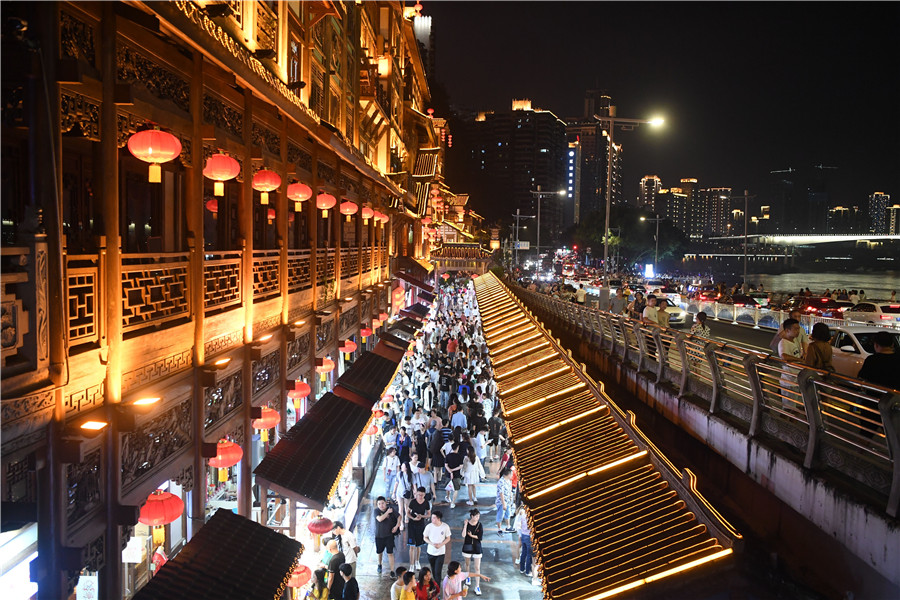Catering, tourism, shopping, retail shine after sunset


The allure of active night life is prompting consumers to spend 1,600 yuan ($228) on a return flight to and from certain tourist destinations in China just to savor popular late-night dishes.
For instance, Changsha in Central China's Hunan province recently attracted Wu Yi, a senior university student in Beijing, for a quick weekend trip.
"I didn't plan the trip in advance. Content about a crayfish restaurant in Changsha went viral on the internet, so I wanted to give it a shot. I really wanted to experience Changsha's famed night life," she said.
Wenheyou crayfish restaurant that Wu visited boasts a record of serving over 7,000 diners on a single night. Thousands of foodies had lined up just for a late-night bite. According to Wenheyou, its sales revenue surpassed 100 million yuan last year.
In recent years, Changsha's nighttime consumption boomed, contributing greatly to the city's economic development. For instance, in the first half of this year, its Furong district saw 274 commercial establishments stay open for business until midnight, and raked in 432 million yuan in total sales. For some food streets, nighttime sales accounted for one-third of total sales, according to local government officials.
"Our busiest time everyday is from 6 pm to midnight. Last year, nearly 3.7 million tourists came to the restaurant," said Li Mingyue, assistant to chairman of the Hunan-based Wenheyou Group.
A report on China's nighttime economy from the Yaok Research Institute showed that in 2017, total sales revenue of Changsha's nighttime industries grew 12 percent year-on-year. The number of people involved in the city's nighttime economy was 49.2 percent more than that of 2016.
"Nighttime economy has extended the consumption duration, serving as a new breakthrough point in consumption growth, a potential bonus," said Mao Zhonggen, director of the Western China Economic Research Center at the Southwestern University of Finance and Economics in Chengdu, Sichuan province.
Apart from the catering sector, commodity retail involving household provisions and consumer goods is an important driving force for nighttime economy. According to Yin Zhixin, from the Guangzhou Development and Reform Commission, the most profitable part of Guangzhou's nighttime economy is commodity retail, with an annual sales revenue of over 280 billion yuan, accounting for roughly 30 percent of the total retail sales.
Nighttime catering ranked second, with around 80 billion yuan in annual sales revenue, which took up two-thirds of daily catering sales.
Food, tourism and shopping top the nighttime economy areas, but new avenues like nighttime exhibition, nighttime reading and nighttime running are becoming popular. Industry experts noted that innovative businesses that focus on mental health and a healthy lifestyle are proving to be new growth points.
This year's Lantern Festival on Feb 19 attracted 570,000 visitors to the photoelectric fireworks show on Sichuan Tower of China in Chengdu. The operator of the tower attributed the new rush to the booming nighttime activities in the city. Fashion bars and museums stay open till late, attracting tens of thousands of young consumers who spend liberally.
Nighttime economy may be booming now but many problems could pose problems in the future. Zhu Dejun, a government official from the Tianxin district in Changsha city, said: "With the rise of people's living standards, demand for night life has increased, and the future of nighttime economy is promising. However, the range of businesses in the sector tends to be predictable and monotonous. Catering alone won't suffice. More innovations are needed."
Yang Jirui, head of the China Consumer Economics Society, said sales during day and night differ, but so do costs, because nighttime operations require lighting, public transportation, public security management, food safety, logistics and emergency management. Such requirements test the efficacy of a city's urban management systems.
"These support services must keep pace with the evolution of nighttime economy and be offered constantly," Yang said.




































